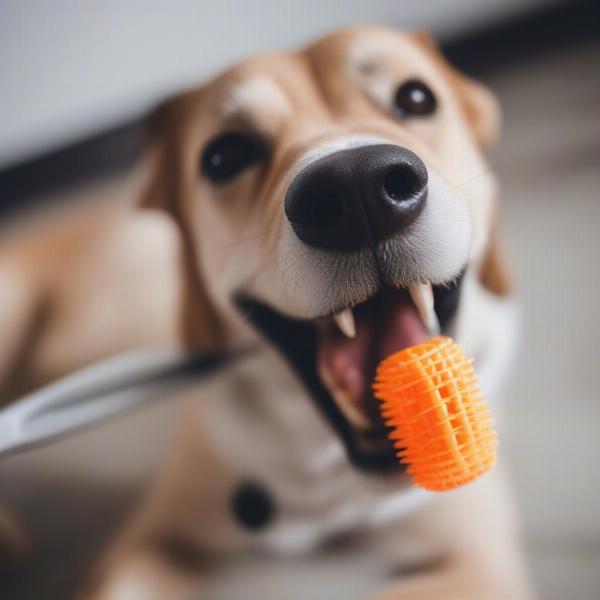Dog tooth pain can be a distressing experience for both you and your furry friend. Recognizing the signs, understanding the causes, and knowing the treatment options are crucial for ensuring your dog’s oral health and overall well-being. This guide provides practical advice and insights into managing dog tooth pain, from home remedies to professional veterinary care.
Recognizing the Signs of Dog Tooth Pain
Identifying tooth pain in dogs can be challenging, as they often hide their discomfort. However, being observant can help you spot potential issues early on. Look out for these common signs:
- Changes in Eating Habits: Difficulty chewing, dropping food, favoring one side of the mouth, or a complete loss of appetite.
- Excessive Drooling: More drool than usual can indicate oral discomfort.
- Pawing at the Mouth: If your dog frequently paws at their mouth or rubs their face against objects, it could signal tooth pain.
- Whining or Whimpering: These vocalizations, especially while eating, can be signs of pain.
- Swollen or Red Gums: Inflamed gums, sometimes accompanied by bleeding, can indicate dental problems.
- Bad Breath: Unusually foul breath can be a sign of infection or decay.
- Behavioral Changes: Increased irritability, lethargy, or reluctance to play can sometimes be linked to underlying pain.
Common Causes of Dog Tooth Pain
Several factors can contribute to tooth pain in dogs. Understanding these causes can help in prevention and treatment. Some common culprits include:
- Periodontal Disease: This is the most common dental problem in dogs, caused by plaque and tartar buildup.
- Fractured Teeth: Chewing on hard objects can lead to chipped or broken teeth, exposing sensitive nerves.
- Abscesses: Infections at the root of a tooth can cause painful abscesses.
- Gingivitis: Inflammation of the gums can cause pain and discomfort.
- Retained Baby Teeth: Sometimes, baby teeth don’t fall out as they should, leading to overcrowding and pain.
- Oral Tumors: Although less common, tumors in the mouth can cause significant pain.
Dog Tooth Pain Treatment Options
Depending on the cause and severity of the pain, various treatment options are available:
- Veterinary Examination: The first step is always a thorough examination by a veterinarian. They can diagnose the underlying cause and recommend the appropriate treatment.
- Professional Cleaning: For periodontal disease and tartar buildup, a professional dental cleaning under anesthesia is necessary.
- Tooth Extraction: Severely damaged or infected teeth may need to be extracted.
- Pain Medication: Your veterinarian can prescribe pain relievers to manage your dog’s discomfort.
- Antibiotics: If an infection is present, antibiotics will be necessary.
Home Care for Dog Tooth Pain
While professional veterinary care is essential, you can also take steps at home to support your dog’s oral health and alleviate minor discomfort:
- Dental Chews: Offer dental chews designed to help clean teeth and reduce plaque buildup.
- Toothbrushing: Regular brushing with dog-specific toothpaste is one of the best ways to prevent dental problems.
- Dental Treats: Certain dental treats can help freshen breath and reduce plaque.
- Dental Toys: Some toys are designed to promote chewing and help clean teeth.
- Dental Diets: Specialized dental diets can help reduce plaque and tartar formation.
 Dog Chewing a Dental Toy
Dog Chewing a Dental Toy
Conclusion
Addressing dog tooth pain promptly is vital for their overall health and well-being. By being aware of the signs, understanding the causes, and seeking appropriate veterinary care, you can help your canine companion enjoy a pain-free and healthy mouth. Don’t hesitate to contact your veterinarian if you suspect your dog is experiencing dental discomfort.
FAQ
- How can I tell if my dog has a toothache? Look for signs like changes in eating habits, excessive drooling, pawing at the mouth, bad breath, and swollen gums.
- What can I give my dog for tooth pain at home? While home remedies can offer temporary relief, always consult your vet before administering any medication. You can try offering dental chews or soft food.
- How much does it cost to treat a dog’s toothache? The cost varies depending on the specific treatment required, ranging from a simple cleaning to a more complex extraction.
- Can I prevent my dog from getting toothaches? Regular brushing, dental chews, and professional cleanings can significantly reduce the risk of dental problems.
- Is dog tooth pain a serious issue? Untreated dental problems can lead to serious health issues, so it’s essential to address them promptly.
- How often should I brush my dog’s teeth? Ideally, daily brushing is recommended.
- What kind of toothpaste should I use for my dog? Never use human toothpaste; always use toothpaste specifically formulated for dogs.
ILM Dog is your trusted resource for comprehensive dog care information. We offer expert advice on dog breeds, health, training, nutrition, grooming, and much more. From dog with dental braces to understanding dog breeds with underbite, we cover a wide range of topics to help you provide the best care for your furry friend. furrytails dog grooming and healthy advantage oral care for dogs are also important topics we cover. For specific breed-related dental issues like class 3 malocclusion dog, we have dedicated resources. Contact us today for expert advice and personalized guidance on all aspects of dog care. Email: [email protected], Phone: +44 20-3965-8624. ILM Dog is dedicated to helping you and your dog live a happy and healthy life together.